
How to Get Rid of Dirt
Make getting rid of extra dirt easy with our straightforward dirt disposal guide. Find the right disposal option for your project below.
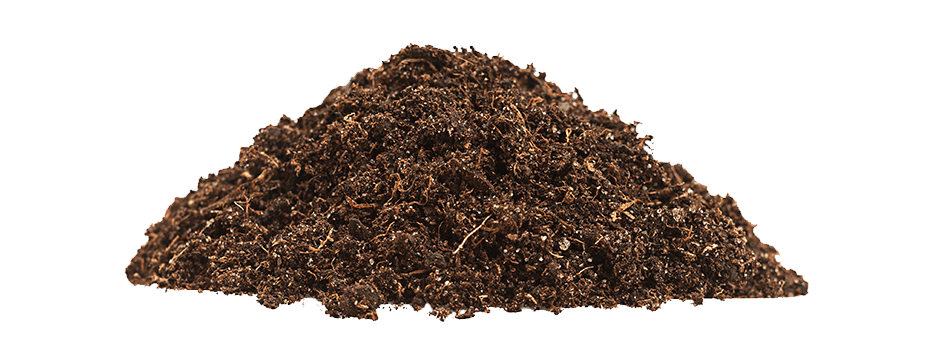
The Complete Dirt Disposal Guide
Whether you’re breaking ground on new construction or redoing your flower beds, you may be wondering how to remove dirt from your yard in an efficient, cost-effective way. We’ve broken down the most common dirt disposal options so you can find the best way to get rid of soil for your specific needs. Check out the following information to help make the best decision.
Ready to Get Rid of Dirt, Fast? Order a Dumpster Online
6 Ways to Dispose of Dirt
When finding the best disposal option for your dirt there are a few key factors to consider. Check out the following information to help make the best decision.
![]()
Rent a Roll Off Dumpster
Pros: Offers a guaranteed pickup at an upfront cost.
Cons: Weight limits, accepted materials and dumpster sizes can vary.
Cost: Starts at $217
![]()
Post a Listing Online
Pros: Free and often collected for you by the buyer.
Cons: Removal time depends on the buyers.
Cost: Free
![]()
Leave a “Free” Sign Out
Pros: An easy way to share and reuse any dirt.
Cons: Not a guaranteed removal option and isn’t ideal on public property.
Cost: Free
![]()
Hire a Junk Movers
Pros: A scheduled removal where the heavy lifting is done for you.
Cons: The price can increase. You have to be there while it’s being collected.
Cost: Starts at $140
![]()
Dump It Yourself
Pros: Allows you to work at your own pace.
Cons: Requires a pickup truck and may need multiple trips.
Cost: $30 to $50 per cubic yard
![]()
Recycle It
Pros: A flexible, fast removal option that allows for reuse.
Cons: Landscaping companies may charge a fee.
Cost: Free
Dirt Disposal Options
1. Rent a Roll Off Dumpster
This is a simple way to dispose of dirt from any landscaping or construction project. Whether you have a large amount of dirt from a job or you want to complete a DIY project but can’t drive the dirt to and from the landfill, a dumpster rental is a convenient option.
We can drop off and pick up your dumpster at your convenience. You don't even need to be home for delivery or pickup — tell us where you want it, and we'll take it from there so you can get to work ASAP.
To rent a roll off dumpster for dirt removal, simply call and schedule a delivery date that’s convenient for you. Just remember that dumpster sizes and weight limits can vary depending on your location, and some dirt dumpsters can only be filled with dirt. Once your container arrives, you can load leftover dirt at your own pace and we’ll haul it away when you’re finished.
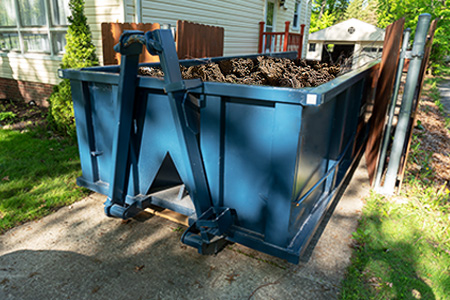
Benefits | Things to Consider |
|---|---|
|
|
|
|
|
|
2. Post a Listing Online
If you’re trying to get rid of your dirt without spending a penny, try listing it online. Many contractors and DIYers browse sites like Craigslist, Freecycle and Facebook for inexpensive dirt and soil to use in their projects. You could list your soil as available for free pickup or offer to deliver it if you need to get it off your hands quickly. Additionally, you can use community sites, like Reddit, to dispose of your excess dirt. Join your local subreddit and post your offer there to see if anyone is interested in taking it.
You can also browse dirt-specific classified sites, including FreeDirt.com, Clean-Fill-Wanted.com and DirtFill.com. These sites match you with local wanted ads for soil and fill dirt, usually for a fee.
Benefits | Things to Consider |
|---|---|
|
|
|
|
![]()
Important:
Before selling or getting rid of dirt online, check your local laws.
Be mindful of your local laws for sharing dirt. Depending on your location, you may need a permit to sell or give away dirt for use on another property. Check with your local government to ensure you’re complying with any city regulations.
3. Leave a "Free" Sign Out
If you’re looking for a free dirt removal option, you can always leave a “Free Dirt” sign out on your lawn to attract potential takers. Make sure the dirt is easily accessible in case someone wants to haul it away when you’re not home. If it isn’t nearby, add a phone number to the sign so they can call you. If you’re part of a homeowners association, check to see if you’re allowed to leave your materials sitting out in the open before you choose this option.
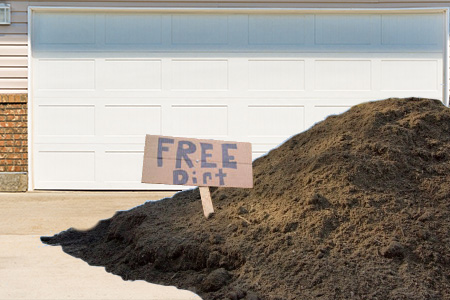
Benefits | Things to Consider |
|---|---|
|
|
|
|
|
|
4. Hire a Junk Removal Company
Some junk removal companies provide soil removal services. If you’re looking for someone to do most of the work for you, a junk removal company can help. These companies usually schedule a delivery window and send out professionals to determine the hauling price upon arrival. Then, they will load up your dirt and haul it away for you. Typically, junk removal services use trucks with 2-ton weight limits, which is about the amount that can fit in the back of a pickup truck. Because of this, this option is usually better for getting rid of small amounts of soil.
Benefits | Things to Consider |
|---|---|
|
|
|
|
|
5. Dump It Yourself
If you're hoping to handle dirt removal on your own, you might be able to dump it yourself, depending on your area. Try your local landfill first. Most waste disposal sites will accept inert debris, like soil, for a per-ton cost. Search online to find a local landfill or transfer station that accepts dirt and is open to the public. Dumping debris on your own works for some projects, but larger amounts of dirt may call for a bigger disposal solution. If you don’t have a pickup truck or trailer, this probably isn’t the best option for you.
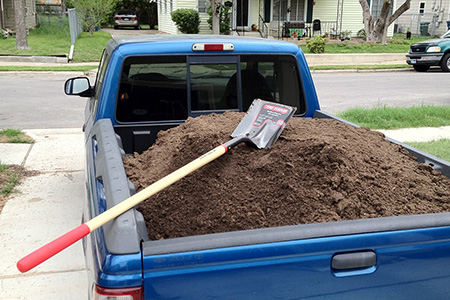
Benefits | Things to Consider |
|---|---|
|
|
|
|
6. Try Recycling Your Dirt
For a low-cost, environmentally friendly solution, consider recycling or reusing your soil. There are plenty of ways to reuse dirt, like in DIY home projects, or you can donate it. If you have high-quality dirt and want to get rid of it for free, consider reaching out to local nonprofits like community gardens or urban farmers.
Benefits | Things to Consider |
|---|---|
|
|
|
|
|
|
Store It for Reuse
Keep your leftover dirt in soil bins for future backyard projects. Just make sure the barrels are waterproof and keep them out of the elements and direct sunlight. Some backyard projects to use up extra soil include:
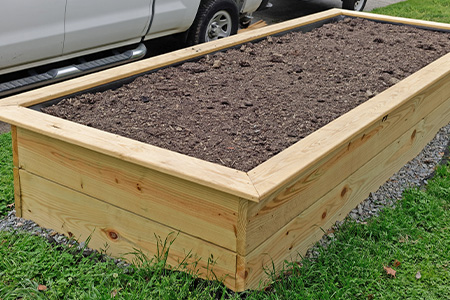
Take It to a Landscape Supplier
If you have a truck and some extra time, take your dirt to a landscape supplier. Some local home and garden centers will accept dirt and soil for a small fee. From there, they can mix the dirt into compost for their plants. If the soil is high quality, they may even sell it.
Find a Local Recycler to Accept Dirt and Debris
Some recycling companies accept dirt as construction and demolition waste. To recycle any dirt you may have, you’ll need to find a Construction and Demolition recycler. This is a landfill that accepts any kind of debris from the construction process. Examples include roadwork material, excavated material, demolition waste or site clearance waste. Check out the Construction & Demolition Recycling Association’s facility locator to find a recycler near you.
How Much Does Dirt Removal Cost?
The cost to remove dirt can be anywhere from $0 to $1,200+ depending on the removal option, the amount of dirt, and how much it weighs. For instance, 2 cubic yards of dry soil weighs almost 2 tons. But if wet, the same amount of soil weighs around 3 tons. This difference will impact your total cost, so keep that in mind when choosing the right disposal solution for your project.
Costs of Various Dirt Disposal Methods
Disposal Option | Cost |
|---|---|
| |
| |
| |
| |
What's the Cheapest Way to Get Rid of Dirt?
Budgeting for dirt removal can be tricky, especially when using a smaller dirt disposal option like a junk removal service. Junk removal trucks are typically limited to a 2-ton load, which costs around $600. If your materials weigh more than this, the company will have to schedule a second pickup, which could double your costs to $1,200.
In contrast, the average cost of a 10 yard roll off dumpster is $410, which can include up to a 10-ton weight limit depending on where you live. Because it can be hard to estimate the weight of dirt on large projects, it’s typically more cost-efficient to rent a dirt dumpster or haul and dump the materials yourself.
Getting Rid of a Lot of Dirt? Order Online
How to Get Rid of Different Types of Dirt
Different types of dirt require different disposal methods, so make sure you know what kind of soil you’re working with. If your dirt is hazardous, you’ll need to take it to a facility to ensure it’s thrown out properly.
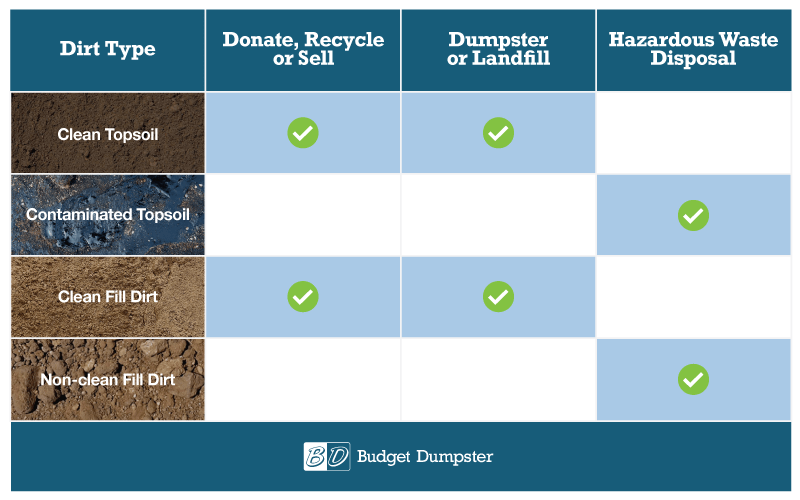
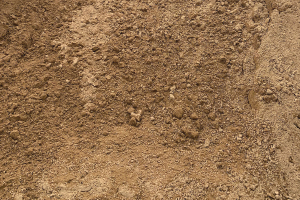
Clean Fill Dirt
This material is used to fill holes left by excavation projects. It’s usually a light color with little to no organic matter, making it bad for growing plants. It can be easily tossed, recycled or sold.
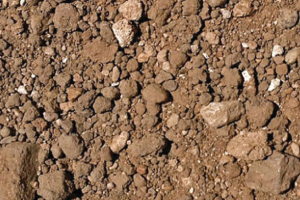
Non-Clean Fill Dirt
Construction and demolition waste that contains nonhazardous materials like plastics, glass, metals, cardboard and more is considered non-clean fill dirt. This has to be taken to a facility to be disposed of safely.
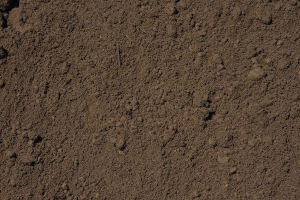
Clean Topsoil
Topsoil is a blend of sand, silt and clay and has plenty of organic matter in it. It’s great for growing and can be easily disposed of by donating, recycling, selling or tossing it.
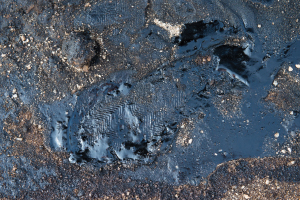
Contaminated Dirt
Contaminated dirt is any kind of soil that’s tainted by pollution or chemically altered. Like non-clean fill dirt, contaminated dirt needs a hazardous waste facility for remediation. Search online to find a soil recycling center near you that is equipped to handle your materials.
Ready to Order Your Dirt Dumpster? Order Online
Frequently Asked Questions About Dirt Disposal
Where can I dump dirt?
Dirt can be dumped safely at the following locations:
- A nearby landfill or transfer station.
- Construction and demolition recycling centers.
- Clean fill dumpsites.
- Landscape or building suppliers that accept dirt.
Dirt should not be dumped on:
- Public property, including parks and wildlife preserves.
- Private property, other than your own.
Remember, you should not dump, sell or give away dirt without first checking with your local city officials and obtaining any necessary permits
Can I dispose of soil that is mixed with other materials?
You can typically toss dirt mixed with rocks, leaves and other inert or biodegradable waste into a roll off dumpster. But call ahead if you’re uncertain about your debris or area restrictions. Note that dumpster services cannot dispose of contaminated dirt or soil that has been mixed with any prohibited materials. Make sure your dirt is free of these materials before throwing it away in a dumpster.
How do I know if my dirt is contaminated?
Make sure your soil isn’t contaminated by looking for any abnormal colors or strong odors. These are sure signs your dirt is contaminated. Another way to tell is if plants don’t grow in that area, although this also depends on the soil's organic content.








